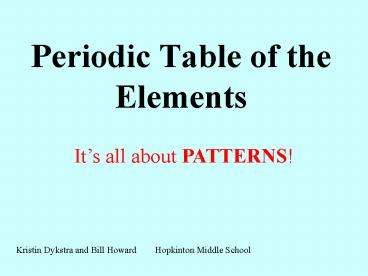Periodic Table of the Elements - PowerPoint PPT Presentation
1 / 26
Title:
Periodic Table of the Elements
Description:
Kristin Dykstra and Bill Howard Hopkinton Middle School ... Properties of the elements recur in regular cycles ... ductility- ability to be drawn ... – PowerPoint PPT presentation
Number of Views:401
Avg rating:3.0/5.0
Title: Periodic Table of the Elements
1
Periodic Table of the Elements
Its all about PATTERNS!
Kristin Dykstra and Bill Howard Hopkinton
Middle School
2
Periodic Table
A chart of the elements based on the periodic
properties of the elements
periodic regular, repeated pattern
- days of the week
- phases of the moon
- seasons
3
Hello Children
Dmitri Mendeleev Father of the Periodic Table
1869
- serious solitaire player
- wrote all elements on cards and recognized
patterns of physical and chemical properties - even predicted existence of elements yet to be
discovered - compares well with modern periodic table
Properties of the elements recur in regular
cycles (periodically) when the elements are
arranged in order of increasing atomic weight
4
Mendeleevs Periodic Table
5
Modern Periodic Table
6
An elements properties can be predicted from its
location in the periodic table.
7
The Periodic table is arranged into seven periods
and eighteen groups.
8
Period
A row, or horizontal line of elements.
9
7 PERIODS
1
2
3
4
5
6
7
10
Elements within a period have different
properties. They slowly change as you go left to
right
But there is a pattern to the change
11
Group
A set of elements arranged vertically, in columns.
Also called Chemical Family
12
Zig-Zag Line
Separates the metals from the non-metals in the
table.
B Al Si Ge As Sb Te Po At
nonmetals
metals
13
Physical Properties of Metals
- hardness
Pure gold is very soft.
- shininess- ability to reflect light
Polished gold is very shiny.
- malleability- ability to be pounded into shape
An ounce of gold can be hammered out to 100
square feet!
- ductility- ability to be drawn out into wire
An ounce of gold can be drawn into five miles of
wire!
- conductivity- ability to transmit heat or
electricity
Gold is used for high quality electrical
connectors
- magnetism
Gold is not attracted by a magnet
14
Chemical Family
A group of elements with similar chemical
properties.
15
Hydrogen is grouped with the alkali metals
but is really in a group by itself
16
Alkali Metals (Group 1)
- very soft can be cut with plastic knife
- single valence electron
- never found as pure element in nature
- react explosively with water
17
Alkaline Earth Metals (Group 2)
- 2 electrons in outer energy level
- very reactive, though not as crazy as alkali
metals
- Never found as pure elements in nature
- gray-white color
- fairly hard
- good conductors
Magnesium adds the brilliant white to fireworks
18
Transition Metals Groups 3-12
- most familiar metals copper silver, iron, ect
- bridge very reactive metals on left and less
reactive metals on right
- ductile and malleable
- conduct electricity and heat
- share similar properties
- valence electrons are present in more than one
shell
19
Gold has only one electron in its outer energy
level
but can lie under the ocean for hundreds of years
without corroding!
20
Other Metals
- aluminum and lead are most familiar
- ductile and malleable
- not very reactive resist corrosion
21
Metalloids
- straddle zig-zag line
- properties of both metals and nonmetals
- silicon is a semiconductor
conducts electricity under certain conditions
22
Nonmetals
Found to the right of the zig-zag line
Many are very common and important to life
- most are dull
- brittle not malleable or ductile
- poor conductors of heat and electricity
- many are gases at room temperature
23
Halogen Family Group 17
- 7 valence electrons
- very reactive
- most are dangerous to humans
- halogen means salt former
24
The Noble Gases Group 18
The Snobs
- outer energy levels are full
- very stable and nonreactive
helium
25
Lanthanides and Actinides
(Rare Earth Elements)
Listed below table to save space
- very good conductors
- soft, malleable, shiny
americicium use in smoke detectors
26
Work Cited
http//www.chemicalelements.com.
http//dbhs.wvusd.k12.ca.us/webdocs/Gallery/Galler
y9.html
http//www.msnbc.com/news/2081492.jpg
http//www.goldinstitute.org/facts
http//www.theodoregray.com/PeriodicTable/Elements
/011/index.s7.html
http//129.93.84.115/Chemistry/Commercial_Software
/GIFs/oxygensfit2_bits_8.GIF
http//www.rentrain.com/resources/Helium20Safety.
jpg
http//www.fitt-signs.co.uk/neon.htm































